Most recently published
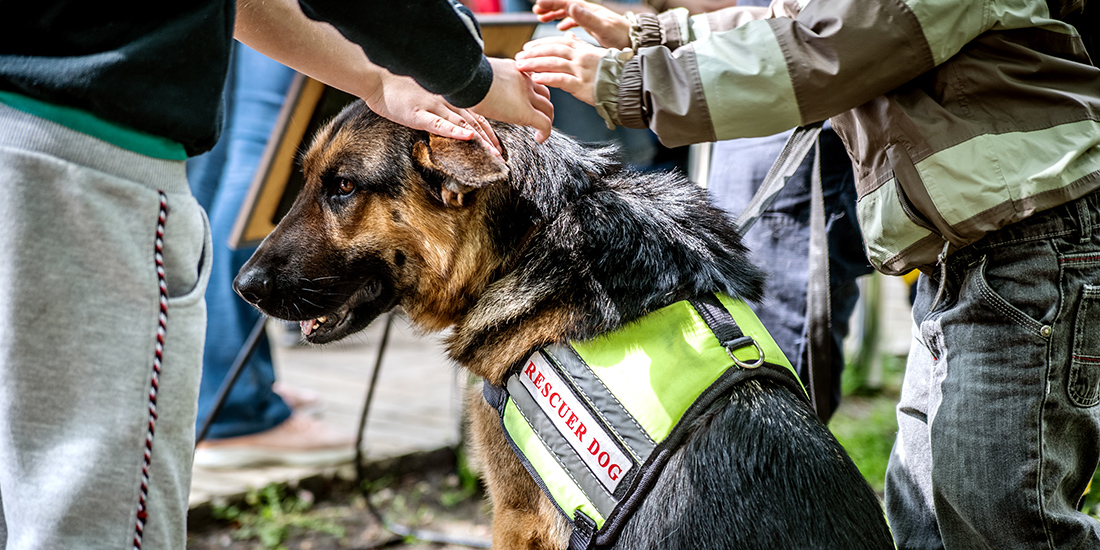
Editor’s Note – Special Units and Underutilized Resources
Catherine L. Feinman
June 25, 2025
This June edition of the Domestic Preparedness Journal provides a glimpse into the many possibilities that exist within a community to better respond by leveraging special units and underutilized resources.
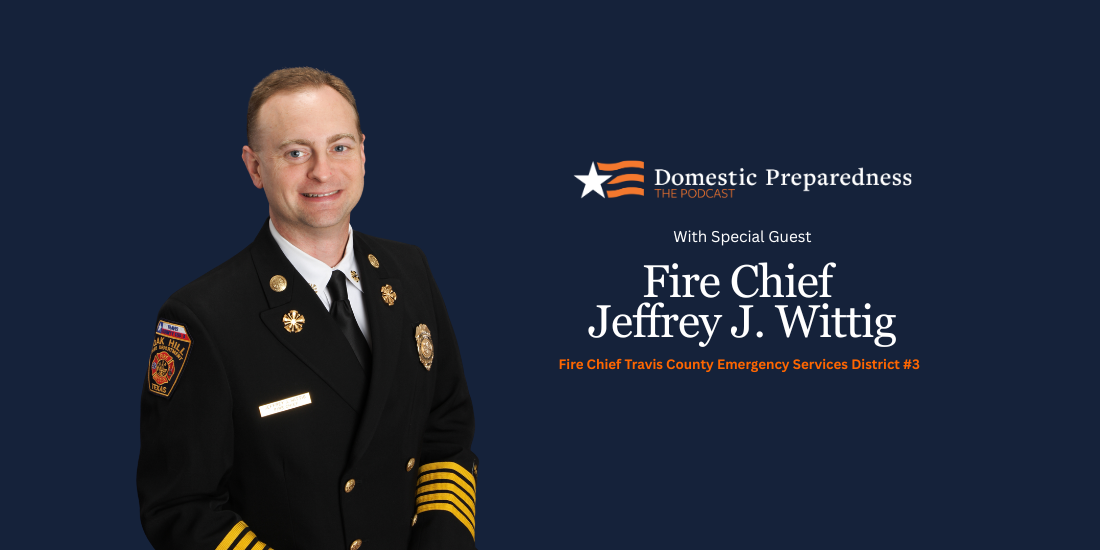
Podcast – Built to Serve: Jeffrey J. Wittig on TIFMAS, Teamwork, and Emergency Response
Jeffrey J. Wittig
June 25, 2025
This is an interview with Fire Chief Jeffrey J. Wittig, a podcast by Domestic Preparedness, June 25, 2025. Hon. Craig Fugate, former director of the Federal Emergency Management Agency, discusses his philosophy of emergency management with Domestic Preparedness Journal Marketing Coordinator Nicolette Casey-Phillips. From overseeing record-breaking disasters to transforming emergency
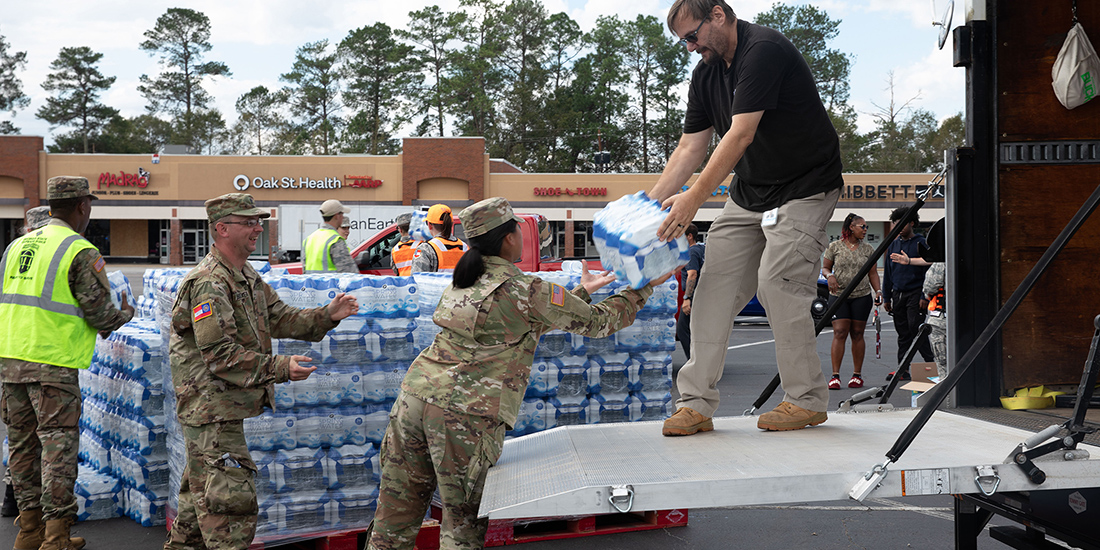
State Defense Forces: The Untapped Backbone of Emergency Response
Robert Hastings
June 25, 2025
As disasters become more frequent, states face pressure to expand response capacity without raising costs. With stretched National Guard resources, limited federal support, and finite mutual aid, states have an overlooked resource: Title 32 State Defense Forces.
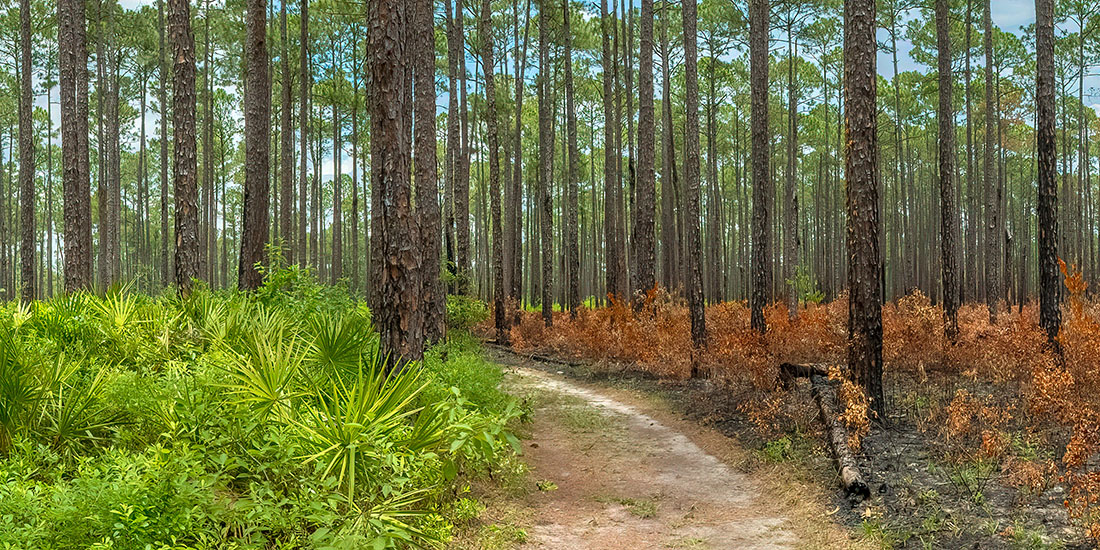
Wildfire PREsponse: Closing the Gap With Mitigation
Mark Howell
June 18, 2025
Mitigation is essential to managing wildfires. As fire seasons grow longer and more costly, responders should be PREsponders, and mitigation experts may participate in response. Coordinated efforts to prevent wildfires are a proven strategy to address the next fire season.
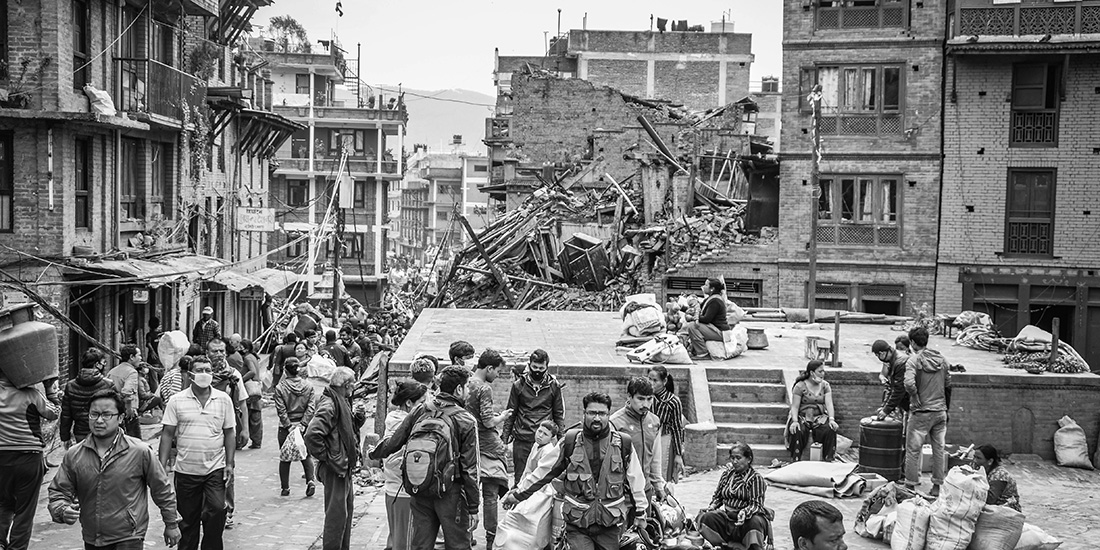
Public Order Policing Units in Disasters
Robert Leverone
June 18, 2025
Modern disasters highlight the critical need for effective crowd control and management, especially when people are deprived of essential resources. The role of specialized law enforcement units in managing crowds is vital to ensuring that disaster response efforts can reach and assist victims efficiently and peacefully.
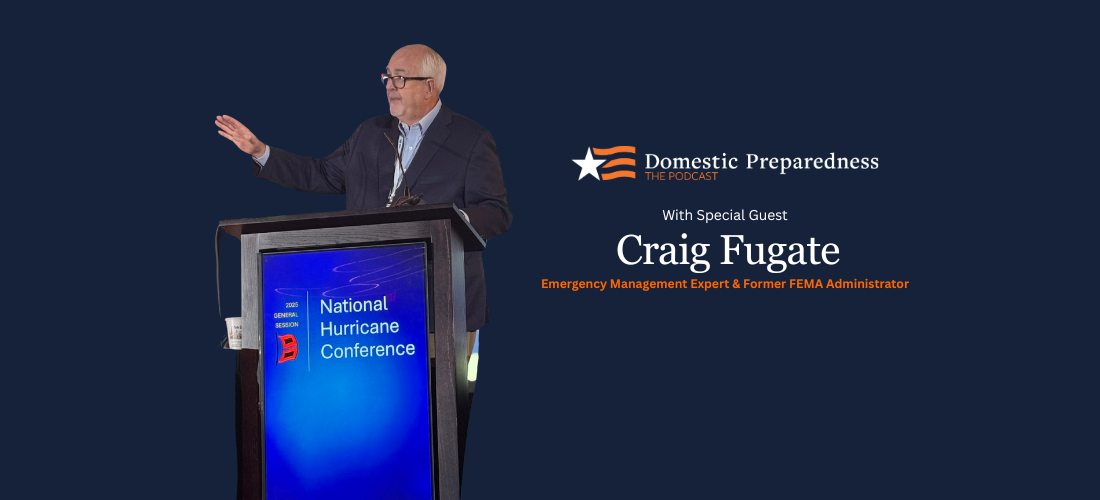
Podcast – Reframing Hurricane Response: Craig Fugate on Survivors as a First Line of Defense
The Honorable Craig Fugate
June 11, 2025
This is an interview with The Honorable Craig Fugate, a podcast by Domestic Preparedness, June 11, 2025. Hon. Craig Fugate, former director of the Federal Emergency Management Agency, discusses his philosophy of emergency management with Domestic Preparedness Journal Marketing Coordinator Nicolette Casey-Phillips. From overseeing record-breaking disasters to transforming emergency management,
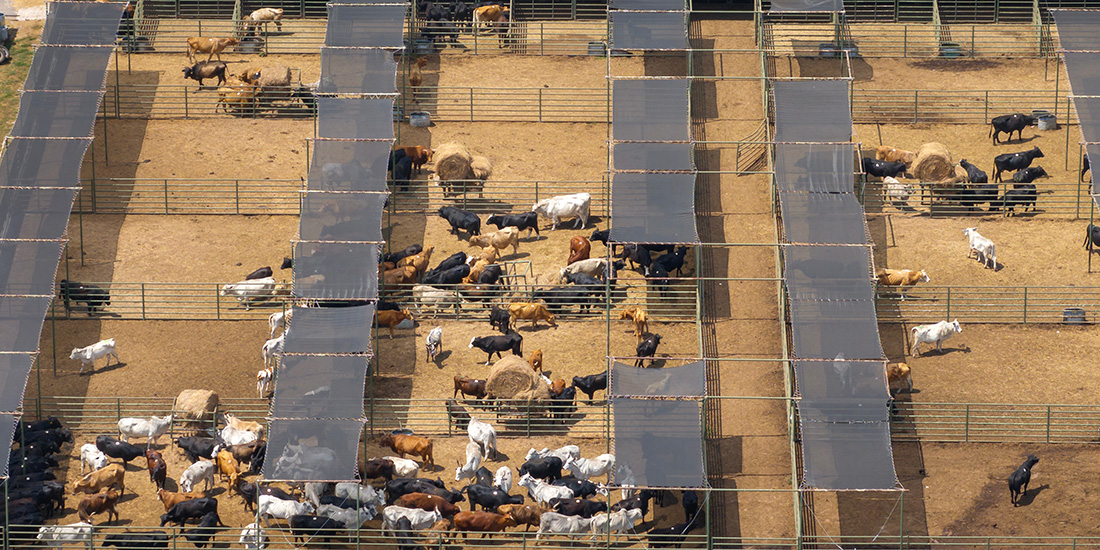
Managing Animal Loss: Emergency Carcass Operations
Joshua Dise and Marshal Wilson
June 11, 2025
Carcass management is rarely top of mind for emergency managers, but during mass animal deaths, it tests preparedness, coordination, and public trust. Including it in all-hazards planning closes a critical gap and boosts community resilience.
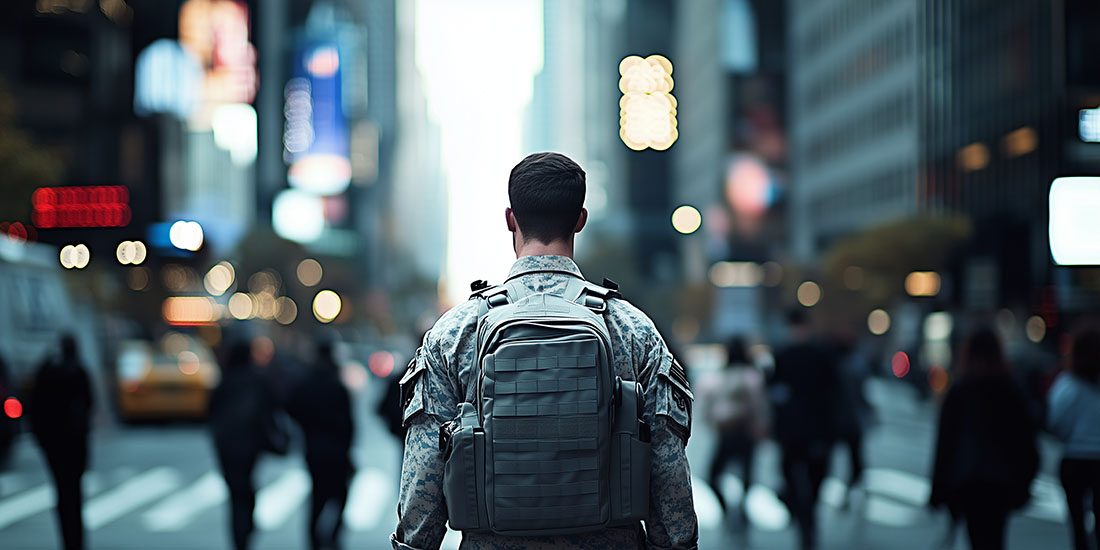
Why Emergency Management Is a Good Career for Transitioning Veterans
Mathew Perrill
June 11, 2025
For many service members, the transition from the military to a civilian workforce can be challenging. They have been trained in a specialized skill set and now must determine how to effectively apply those skills in civilian employment. In the emergency management field, veterans can find the vocational purpose they

A Proven Path: Scouts and the Operational Value of Prepared Youth
Ethan Beaty
June 4, 2025
Scouts have been trained to stay calm under pressure, take meaningful action in moments of uncertainty, and support others in times of crisis. Their role in emergency response should not be underestimated.

Understanding Service Dogs: What First Responders Need to Know
Susan Cohen
June 4, 2025
Service dogs do far more than guide or retrieve—they are medical equipment, trained to monitor, alert, and even intervene during a health crisis. For first responders, understanding these working dogs can mean the difference between life and death.

Editor’s Note – Hazards That Can Affect the Mind, Body, and Outcome
Catherine L. Feinman
June 2, 2025
Many factors in the work environment can negatively impact a responder’s mental or physical health. These psychosocial hazards can particularly affect people in high-stress, high-consequence occupations and others in critical roles during emergencies and disasters.

Caring for the Affected at Family Assistance Centers
Jennifer Stansberry Miller
May 28, 2025
In moments of crisis, a well-executed family assistance center can offer clarity, connection, and compassion that victims’ families and survivors need to begin making sense of loss and change. Family assistance centers provide resources for support services, updates on victim identification, assistance with repatriation of remains, and reunification efforts. Discover
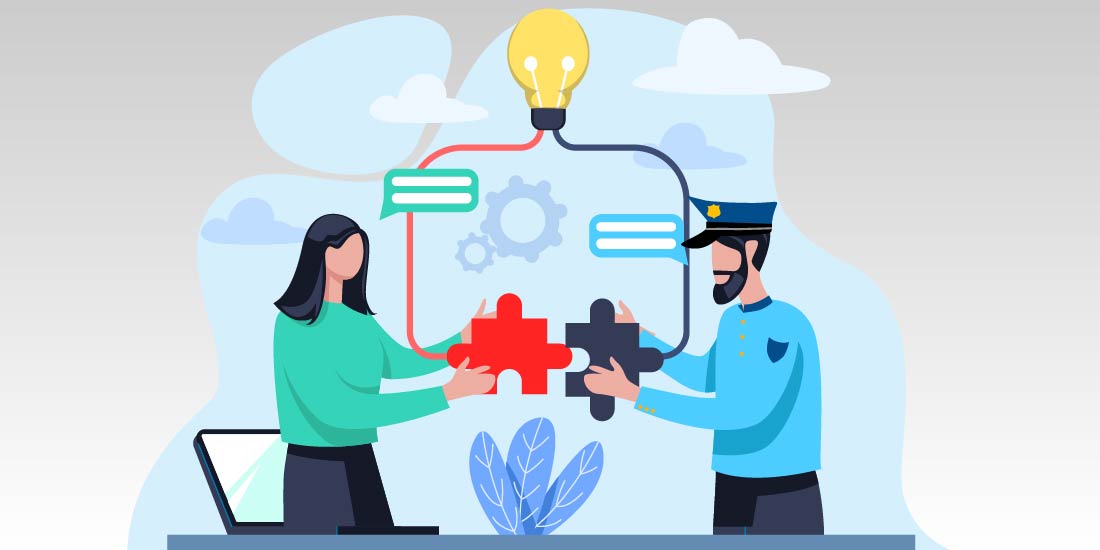
Law Enforcement Collaboration Within Multidisciplinary Teams
Richard Schoeberl and Anthony (Tony) Mottola
June 25, 2025
Multidisciplinary teams are inherently collaborative and benefit intricate police cases and vulnerable populations. Adopting the expertise of professionals in medicine, social work, forensics, and more, these teams deliver a more thorough and efficient response than a single agency could accomplish independently.

Editor’s Note – Special Units and Underutilized Resources
Catherine L. Feinman
June 25, 2025
This June edition of the Domestic Preparedness Journal provides a glimpse into the many possibilities that exist within a community to better respond by leveraging special units and underutilized resources.

Podcast – Built to Serve: Jeffrey J. Wittig on TIFMAS, Teamwork, and Emergency Response
Jeffrey J. Wittig
June 25, 2025
This is an interview with Fire Chief Jeffrey J. Wittig, a podcast by Domestic Preparedness, June 25, 2025. Hon. Craig Fugate, former director of the Federal Emergency Management Agency, discusses his philosophy of emergency management with Domestic Preparedness Journal Marketing Coordinator Nicolette Casey-Phillips. From overseeing record-breaking disasters to transforming emergency

State Defense Forces: The Untapped Backbone of Emergency Response
Robert Hastings
June 25, 2025
As disasters become more frequent, states face pressure to expand response capacity without raising costs. With stretched National Guard resources, limited federal support, and finite mutual aid, states have an overlooked resource: Title 32 State Defense Forces.

Wildfire PREsponse: Closing the Gap With Mitigation
Mark Howell
June 18, 2025
Mitigation is essential to managing wildfires. As fire seasons grow longer and more costly, responders should be PREsponders, and mitigation experts may participate in response. Coordinated efforts to prevent wildfires are a proven strategy to address the next fire season.

Public Order Policing Units in Disasters
Robert Leverone
June 18, 2025
Modern disasters highlight the critical need for effective crowd control and management, especially when people are deprived of essential resources. The role of specialized law enforcement units in managing crowds is vital to ensuring that disaster response efforts can reach and assist victims efficiently and peacefully.

Podcast – Reframing Hurricane Response: Craig Fugate on Survivors as a First Line of Defense
The Honorable Craig Fugate
June 11, 2025
This is an interview with The Honorable Craig Fugate, a podcast by Domestic Preparedness, June 11, 2025. Hon. Craig Fugate, former director of the Federal Emergency Management Agency, discusses his philosophy of emergency management with Domestic Preparedness Journal Marketing Coordinator Nicolette Casey-Phillips. From overseeing record-breaking disasters to transforming emergency management,

Managing Animal Loss: Emergency Carcass Operations
Joshua Dise and Marshal Wilson
June 11, 2025
Carcass management is rarely top of mind for emergency managers, but during mass animal deaths, it tests preparedness, coordination, and public trust. Including it in all-hazards planning closes a critical gap and boosts community resilience.

Why Emergency Management Is a Good Career for Transitioning Veterans
Mathew Perrill
June 11, 2025
For many service members, the transition from the military to a civilian workforce can be challenging. They have been trained in a specialized skill set and now must determine how to effectively apply those skills in civilian employment. In the emergency management field, veterans can find the vocational purpose they

A Proven Path: Scouts and the Operational Value of Prepared Youth
Ethan Beaty
June 4, 2025
Scouts have been trained to stay calm under pressure, take meaningful action in moments of uncertainty, and support others in times of crisis. Their role in emergency response should not be underestimated.

Understanding Service Dogs: What First Responders Need to Know
Susan Cohen
June 4, 2025
Service dogs do far more than guide or retrieve—they are medical equipment, trained to monitor, alert, and even intervene during a health crisis. For first responders, understanding these working dogs can mean the difference between life and death.

Editor’s Note – Hazards That Can Affect the Mind, Body, and Outcome
Catherine L. Feinman
June 2, 2025
Many factors in the work environment can negatively impact a responder’s mental or physical health. These psychosocial hazards can particularly affect people in high-stress, high-consequence occupations and others in critical roles during emergencies and disasters.
Meeting the Psychosocial Needs of Child Survivors
Emily Heard
May 21, 2025
Without adequate support and resources, disasters can leave lasting psychological effects on children. In the United States, an estimated 14% of children experience a natural disaster during childhood. Providing psychosocial support is essential in helping them cope with these challenges, thereby building resilient communities.
How I Became an Accidental Disaster Mental Health Specialist
Adrienne J. Heinz
May 21, 2025
Dr. Adrienne Heinz and her young family have lived through multiple historic wildfires in Northern California. She decided to turn pain into purpose and mobilize community health leaders to build a mental health safety net for healing and recovery. The lessons from those experiences now serve as a guide and
Podcast – Seasonal Forecasts & Their Limitations With Dr. Philip Klotzbach
Philip Klotzbach
May 21, 2025
This is an interview with Philip Klotzbach, a podcast by Domestic Preparedness, May 22, 2025. Philip Klotzbach, Ph.D., is a research scientist in the Department of Atmospheric Science at Colorado State University. Dr. Klotzbach developed the two-week forecasts currently being issued during peak months of the hurricane season between August
Physical and Mental Injuries in First Responders: Why Wait?
Pascal Rodier
May 14, 2025
First responders undergo intense physical training to ensure they are physically prepared for emergencies. Yet despite the high-stress nature of their work, mental fitness is not given the same priority. To truly support first responders, mental wellness must be fully integrated into recruit training programs and proactively addressed throughout their
Not Lost in Translation: A Multilingual Corps Approach
Diana Sanchez-Vega
May 14, 2025
Disaster survivors and responders often face psychological hazards like acute stress disorder, depression, and post-traumatic stress. These issues are worsened in multilingual communities, where language barriers hinder communication and delay aid. Effectively addressing these challenges goes beyond basic translation or ad hoc interpreting to address the whole community.
Disaster Stress Management in an Emergency Operations Center
Mary Schoenfeldt
May 7, 2025
Disasters affect responders and community members, but they also bring trauma to those working inside emergency operations centers. Distance from the scene does not create a shield from stress. Secondary traumatic stress can impair leadership, so managing this stress is vital for effective emergency response.
A Holistic Strategy for Responders’ Well-Being
Camilo Olivieri
May 7, 2025
First responders and emergency managers face constant, high-pressure stress from trauma, long hours, and critical decisions. This often leads to chronic stress, increasing risks of heart disease, mental health issues, and substance abuse. Their ability to help others depends on prioritizing their own well-being through proactive self-care.
Bridging Communication Gaps: Lessons from Hurricane Helene
Greg Hauser
April 30, 2025
Hurricanes in 2024 caused widespread damage to infrastructure, leading to a critical but often overlooked issue: isolation. Physical and technological disruptions left public safety personnel and government officials unable to perform essential tasks. While physical destruction was visible, the invisible breakdown of communication systems intensified the sense of isolation and
Connectivity: The Foundation of Disaster Response and Preparedness
Cory Davis
April 30, 2025
In an era of increasingly frequent and severe weather events, the demands on first responders have never been greater. To navigate high-stakes, rapidly evolving situations, reliable connectivity and cutting-edge technology are essential. A fast, secure, and resilient communications network is the backbone of any effective disaster response.
Editor’s Note – Emergency Communications: Tough Lessons From the Maui Wildfires
Catherine L. Feinman
April 30, 2025
The after-action report of the Maui wildfires and the authors in the April edition of the Domestic Preparedness Journal share valuable lessons for strengthening emergency communications in an ever-expanding complex communications ecosystem.
Emergency Alerts: The Missing Link
Rodrigo (Roddy) Moscoso
April 23, 2025
As satellite-to-cell technology grows more common, cell phone makers must move quickly to adopt it. This link can bridge emergency services and the public, no matter the disaster or condition of ground networks. Learn how real-time satellite communication saves lives by offering vital access for users and first responders.
Hidden Barriers to Public Safety Interoperability
Gabe Elias
April 23, 2025
Decades of work have improved public safety’s ability to share information. However, the journey toward better interoperable communication requires uncovering additional hidden barriers.
Follow Us
Get Instant Access
Subscribe today to Domestic Preparedness and get real-world insights for safer communities.


